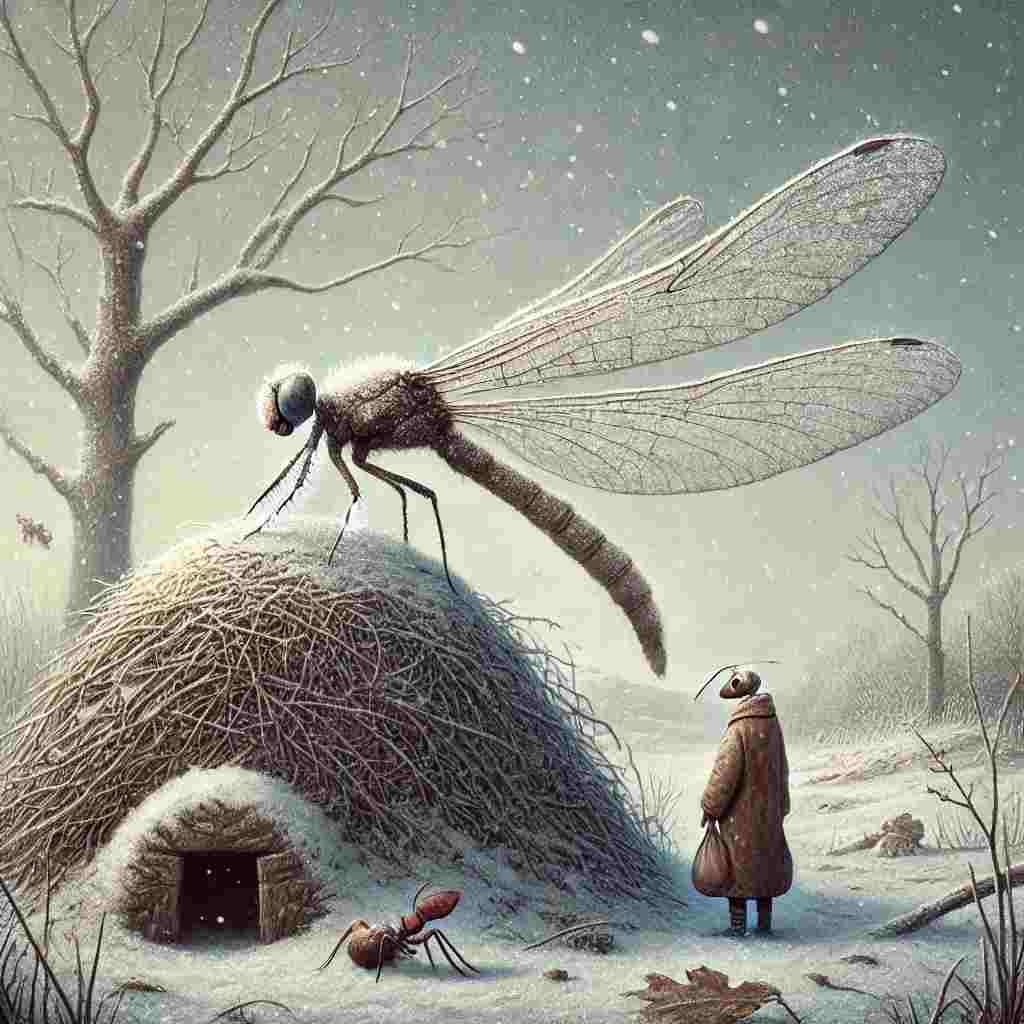The Dragonfly and the Ant (Russian)
Ivan Krylov
1769 to 1844

Want to track your favorites? Reopen or create a unique username. No personal details are required!
Стрекоза и Муравей
Попрыгунья Стрекоза
Лето красное пропела;
Оглянуться не успела,
Как зима катит в глаза.
Помертвело чисто поле;
Нет уж дней тех светлых боле,
Как под каждым ей листком
Был готов и стол, и дом.
Всё прошло: с зимой холодной
Нужда, голод настает;
Стрекоза уж не поет:
И кому же в ум пойдет
На желудок петь голодный!
Злой тоской удручена,
К муравью ползет она:
«Не оставь меня, кум милый!
Дай ты мне собраться с силой
И до вешних только дней
Прокорми и обогрей!»
«Кумушка, мне странно это:
Да работала ль ты в лето?»
Говорит ей Муравей.
«До того ль, голубчик, было
В мягких муравах у нас —
Песни, резвость всякий час,
Так, что голову вскружило».
«А, так ты…» — «Я без души
Лето целое все пела».
«Ты все пела? это дело:
Так поди же, попляши!»
Ivan Krylov's The Dragonfly and the Ant
Ivan Krylov's fable The Dragonfly and the Ant ("Стрекоза и Муравей") is a witty yet cautionary poem that addresses themes of responsibility, foresight, and the consequences of indulgence versus hard work. Reflecting Krylov's broader social critiques, this work echoes the traditional values of prudence and labor over idleness and frivolity, themes that were particularly resonant in the early 19th-century Russian context.
Structure and Tone
Krylov adopts the structure of a classic Aesopian fable but with a distinctly Russian style. The narrative is presented in simple, conversational language that mimics the speech of the peasant classes, making the moral accessible to a wide audience. The poem is largely in a tetrameter with rhyming couplets, providing a rhythmic, almost song-like quality that mirrors the dragonfly's carefree summer singing. However, the lightness of the verse contrasts sharply with the gravity of the poem's moral, creating an ironic tension that underscores the dragonfly's frivolity.
Analysis of Key Passages
Lines 1–8:
The opening lines introduce the dragonfly as a carefree creature who "sang all summer long" ("попрыгунья Стрекоза Лето красное пропела"), encapsulating her lighthearted spirit and neglect of practical concerns. By the time winter arrives ("как зима катит в глаза"), the dragonfly is ill-prepared, and the repetition of seasonal imagery—bright summer, then the bleakness of winter—heightens the sense of an impending hardship that is both inevitable and predictable.
In lines such as "Нет уж дней тех светлых боле" ("those bright days are no more"), the contrast between summer's warmth and winter's harshness serves as a metaphor for the transience of pleasure and the permanence of responsibility. This stark shift marks the onset of the dragonfly's realization, albeit too late, of her vulnerable state.
Lines 9–20:
The dragonfly’s plea to the ant, rendered in a plaintive tone, introduces a sense of desperation as she recognizes her misjudgment. She begs for temporary assistance: "Прокорми и обогрей" ("feed and shelter me"), believing that the ant, symbolizing reliability and preparedness, might overlook her past irresponsibility. Her request to last "до вешних только дней" ("until the days of spring") reflects her shortsightedness, as she seeks a temporary solution rather than a lasting change in behavior.
The ant's response, however, is a mixture of bewilderment and judgment. "Кумушка, мне странно это" ("My dear, this is strange") conveys the ant's disapproval and incredulity at the dragonfly's complete lack of foresight. Her reply sharpens the fable’s critique of those who live heedlessly, expecting others to bear the burden when hardship strikes.
Lines 21–26:
The dragonfly’s reply, "До того ль, голубчик, было… Песни, резвость всякий час" ("We were so caught up in singing, joy every hour"), reveals her frivolous attitude and her inability to comprehend the consequences of her behavior. Her words speak to a mindset absorbed in instant gratification, without thought for the future—a mindset the ant finds deeply irresponsible.
The ant's final retort—"Ты все пела? это дело: Так поди же, попляши!" ("You sang all summer? Well then, go dance!")—delivers the moral with biting irony. The phrase underscores the notion that actions have natural consequences and that one who engages in endless play must eventually "dance" to the tune of those choices.
Themes
Responsibility and Foresight:
At its core, the poem emphasizes the importance of planning and responsibility. The ant, embodying hard work and foresight, emerges as a model of prudence. In contrast, the dragonfly, who chose leisure over labor, symbolizes the pitfalls of a hedonistic lifestyle.
Social Commentary on Class and Labor:
Krylov’s fable can be interpreted as a critique of social attitudes toward work and entitlement. In early 19th-century Russia, where class divides were pronounced, the ant represents the industrious peasant or working class, while the dragonfly may reflect the idle nobility or those who live off others' labor. The poem warns against the complacency of relying on others and underscores the value of self-reliance.
Irony and the Mocking Tone:
The poem’s ironic tone, especially in the ant’s concluding line, not only reinforces the moral but also adds a layer of humor to the narrative. The ridicule in "так поди же, попляши" adds to the poem's didactic nature, suggesting that while self-indulgence may seem appealing, it often leads to bitter outcomes.
Conclusion
The Dragonfly and the Ant by Ivan Krylov is a timeless piece that offers a moral lesson in the value of hard work and preparation. Through the contrasting characters of the dragonfly and the ant, Krylov explores themes of foresight, social responsibility, and the consequences of a carefree lifestyle. By presenting these themes within a simple fable, Krylov makes the poem accessible while also delivering a powerful critique that remains relevant across cultures and eras.
This text was generated by AI and is for reference only. Learn more

